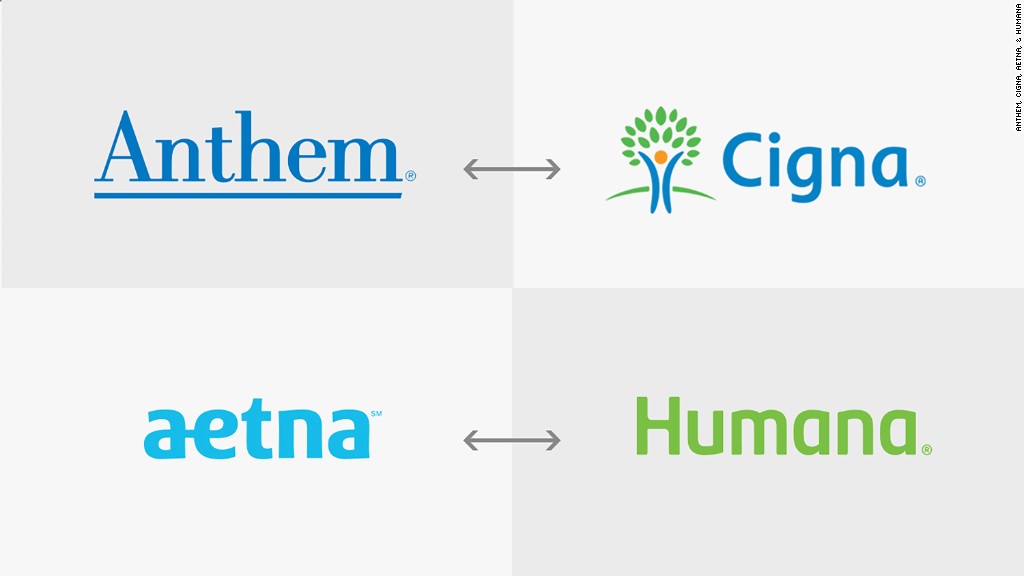
Aetna is reconsidering its participation in Obamacare, making it the latest large insurer to cast doubts on the future of the individual exchanges.
Aetna (AET) said Tuesday it is canceling plans to expand into five more states next year and will reassess its involvement in the 15 states where it currently offers coverage on the individual exchanges. Aetna -- which expects to lose $300 million (pre-tax) on its Obamacare business this year -- must conclude its review by the end of September and notify states where it intends to withdraw.
"...in light of updated 2016 projections for our individual products and the significant structural challenges facing the public exchanges, we intend to withdraw all of our 2017 public exchange expansion plans, and are undertaking a complete evaluation of future participation in our current 15-state footprint," said CEO Mark Bertolini in a second-quarter earnings statement.
Related: DOJ sues to block healthcare mergers
A growing number of insurers on the Obamacare exchanges are voicing concerns about the viability of the program as they run up big losses. Many say that their premiums were too low and didn't cover the cost of care because their consumers are far sicker than anticipated.
Some 11.1 million people are enrolled in Obamacare this year, according to the latest federal statistics.
UnitedHealthcare (UNH), the nation's largest insurer, is exiting most Obamacare exchanges in 2017. Humana announced last month that it was pulling out of nearly 1,200 counties in eight states next year. Afterward, it will only be selling insurance on the exchanges in 156 counties in 11 states. Others, including several Blue Cross Blue Shield companies, are also scaling back.
And more than half of the co-op insurers, created and funded by the health reform law, have failed. This means consumers in a growing number of areas have only one or two insurers to pick from.
To cover these sicker patients, many insurers are requesting big premium hikes for 2017, some in the high double digit percentages.
Insurers are requesting premium increases of 9%, on average, for the benchmark silver plan -- upon which federal subsidies are based -- in major cities in 16 states plus the District of Columbia, according to the latest review by the Kaiser Family Foundation. But this masks substantial variation, with requests ranging from a drop of 13% to an increase of 25%. States still have to review the requests and could change them.
Last year, premiums for the benchmark silver plans in these areas increased 2% following the state reviews.
Related: Obamacare patients sicker and pricier than expected
Insurers' financials should look better in 2017 after the premium increases, said Larry Levitt, senior vice president at the Kaiser Family Foundation. But it also depends on how open enrollment goes this fall. It's been increasingly difficult to attract the remaining uninsured -- particularly the healthy ones -- into Obamacare. And more may be spooked by the higher prices for next year.
The Department of Health and Human Services said insurers are adapting to the new individual marketplace at different rates.
Related: UnitedHealthcare to exit most Obamacare exchanges
The Obamacare exchanges continue to grow every year, "creating major business opportunities for insurers who serve this market well," said Marjorie Connolly, the department's press secretary. "Over the long run, it's consumers' choices that will drive which insurers succeed in the marketplace and benefit from the growth opportunities it continues to create."
Aetna's announcement comes two weeks after the Department of Justice blocked its merger plans with Humana (HUM), as well as Anthem's purchase of Cigna (CI). Anthem (ANTX) last week linked its merger with its Obamacare participation.
"Our acquisition of Cigna will help stabilize pricing in this volatile market, enabling Anthem to continue its commitment to the public exchanges, and provide the opportunity to expand our participation to nine additional states, where neither Anthem nor Cigna currently participate," said Anthem CEO Joseph Swedish in an earnings call.
The performance of Aetna's Obamacare business is deteriorating as policyholders seek more care than expected, the company said. Pharmacy costs are a particular problem.
Aetna had 838,000 exchange customers at the end of June.
Earlier this year, Bertolini had been more optimistic about Obamacare's future, saying the company would continue working with the government and lawmakers to set it on a more sustainable path. He said he expected the company would reach its goal of breaking even on its Obamacare line of business in 2016, even though it lost more than $100 million in 2015.
Also, the company was worried about the riskiness of its enrollee pool and the inadequacy of the government program designed to offset those risks.
The risk adjustment program -- which requires insurers with healthier-than-average customers to fund payments to peers with sicker-than-average enrollees -- has come under attack from several companies. Customers' health status is based on diagnoses of chronic costly conditions, such as diabetes and HIV.
Aetna, among others, argues that enrollees' use of prescription drugs, particularly expensive specialty drugs, should be included in the formula, said Timothy Jost, a law professor at Washington and Lee University.
The company has had to pay into the risk adjustment program in 2014 and 2015.


